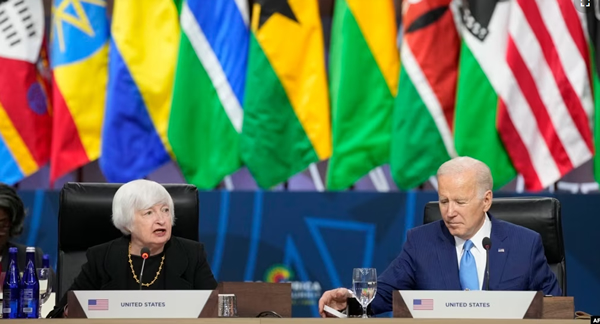
U.S. Treasury Secretary Janet Yellen is headed to Senegal, Zambia and South Africa this week to discuss trade expansion, investment and the U.S. commitment to African economies.
This comes after a promise from President Joe Biden at the U.S.-Africa Leaders’ Summit last month that he and members of his Cabinet would visit Africa in 2023.
“I think this is the first in many steps to engage Africans on the continent,” said Cameron Hudson, a senior associate with the Center for Strategic and International Studies’ Africa Program. But he told VOA, “There’s an overall message [U.S. officials] are trying to send as well, which is Washington is present, and that message is not only for the Africans but for the Chinese, Russians competing with the U.S. in these markets.”
Senior U.S. Treasury officials maintain that the purpose of the trip is to exchange ideas with African government officials, private sector leaders, entrepreneurs and youth, and to deepen economic ties between the U.S. and Africa, charting new opportunities for trade and investment.
Senegal
Yellen’s first stop is Senegal, where she will visit a business incubator providing credit and sector-specific technical assistance to young women entrepreneurs in the capital, Dakar.
She will also participate in a business forum with leaders from the American Chamber of Commerce in Senegal and the groundbreaking of a rural electrification project being led by U.S. engineering firm Weldy Lamont.
The project, Treasury officials say, is supported by a U.S. government initiative known as Prosper Africa and $100 million in financing from the U.S. Export-Import Bank.
Secretary Yellen also plans to visit Gorée Island, a UNESCO World Heritage site that served as a slave trading post in West Africa.
The Treasury chief will meet with Senegalese President Macky Sall, the African Union chair whose country is also a leading member of the Economic Community of West African States, or ECOWAS.
This could be an opportunity for Sall to discuss other issues including unfair international trade practices, said Chisanga Chekwe, president of the Canada-based Masomo Education Foundation charity.
Four African countries – Benin, Burkina Faso, Chad and Mali – are among the most efficient cotton producers in the world, says Chekwe. “Three of the countries are in ECOWAS, and all four are in the AU,” Chekwe said. Benin, Burkina Faso and Mali are ECOWAS members. The AU refers to the African Union.
“Here is an interesting thing. Despite their efficiency, they only contribute 3% to world cotton production,” Chekwe said.
The reason, Chekwe said, is that cotton production is heavily subsidized in most countries, a reality that tends to distort markets.
Zambia
Chekwe is also the author of many books on African issues, especially on Zambia, where he said America sees an opportunity to counter Chinese influence with a new government that is considered pro-West.
“It’s seen as a government that’s weary of China. … One possible area of immediate cooperation is the restructuring of a $6 billion debt Zambia has to China, and let’s remember that makes up 24-25% of the country’s GDP [gross domestic product],” he said.
In 2020, Zambia became the first African country in the COVID pandemic era to default on its debt. But regardless of whether money is owed to China or financial institutions, Zambia is not the only African country with a debt burden, said Hudson.
“Ghana, another successful African country, is really experiencing a mounting crisis there, so Washington is seen as partly responsible,” he said. “Because like it or not, Washington is seen as controlling the international financial institutions of the World Bank and the IMF [International Monetary Fund], which have pushed for austerity measures on African states, kept interest rates on international lending very high to African states and at the same time has been critical of concessionary lending they’ve received from China, Russia and others outside of a multilateral system.”
The U.S. Treasury secretary met with Zambian President Hakainde Hichilema at the summit last month and emphasized the need to work on a debt plan treatment for Zambia under the Common Framework, an initiative endorsed by the G-20 and others, as quickly as possible. The G-20 represents the 20 largest economies in the world.
While in Zambia, Yellen will meet with Hichilema again, along with his finance minister and that nation’s central bank governor. She’ll also tour two agriculture-related sites in an effort to promote climate-resilient agriculture and food production and mitigate the effects of the Russian war in Ukraine.
The war has had enormous economic effects on the global wheat, energy and fertilizer supplies, “all of which are affecting Africans much more acutely than anyone else in the world. This comes on top of a slow recovery from the COVID pandemic,” said Hudson.
During the summit last month, Biden announced his administration will spend $2 billion in humanitarian assistance to address acute food insecurity in Africa, to “help ensure that children and families don’t have to go to bed hungry.”
South Africa
In South Africa, Yellen will meet with the country’s finance minister and reserve bank governor.
She’ll also visit a Ford Motor Co. assembly plant outside Pretoria. The facility, which employs more than 4,000 people, is slated to become carbon neutral by next year.
Yellen’s Africa tour coincides with a visit by IMF Managing Director Kristalina Georgieva to Zambia next week. Chinese Foreign Minister Qin Gang just completed a five-nation Africa tour that took him to Ethiopia, Angola, Benin, Gabon and Egypt.
Prior to arriving in Senegal, Yellen will meet with her Chinese counterpart, Vice Premier Liu He, in Switzerland on Wednesday.
Source: voanews.com























